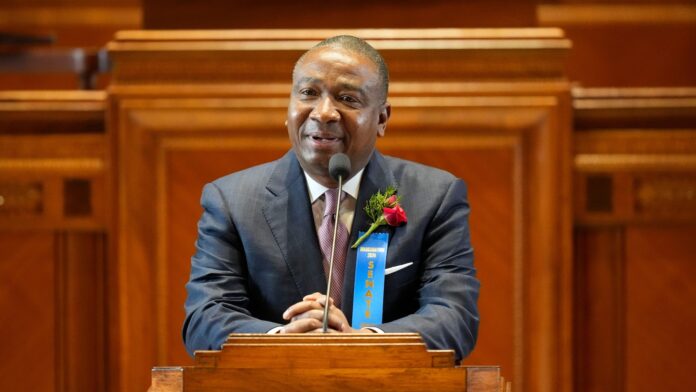BATON ROUGE, Louisiana — Poised to capture a once-reliably Republican congressional seat in Louisiana, Democrats are pinning their hopes on Sen. Cleo Fields, a fixture in state politics for more than three decades and eager to return to Congress.
Political experts say the path to Washington appears paved for Fields, as he is running in a recently redrawn 6th District, which became the second majority-black district in the state. Its composition favors a likely Democratic victory, which will affect incumbent GOP Rep. Garret Graves not wanting to be re-elected.
Fields, 61, quickly gained the support of the Louisiana Democratic Party and amassed a significant financial advantage during the campaign.
“Cleo is the clear front-runner in this race,” said Robert Hogan, chairman of Louisiana State University’s political science department. “Given his campaign financing, his name recognition throughout the state and the fact that he is a prominent African-American who has received a lot of attention for his work in the Legislature.”
But Hogan also noted that Fields’ notoriety is tied to “some negative things,” an old scandal that opponents were quick to point out: most notably a grainy 1997 FBI video showing Fields holding a wad of cash former governor Edwin Edwards ‘ office.
The recording was used as evidence in Edwards’ 2000 federal corruption trial, in which Fields was named as an unindicted accomplice but not charged with a crime. Edwards was convicted of accepting bribes from riverboat casino applicants and spent eight years in prison.
Quentin Anthony Anderson, a political newcomer and Democrat running against Fields, brought up the scandal when qualify for the election earlier this month. The executive chairman of a social justice nonprofit said voters should consider, among other things, “who we are as Louisiana” and “what politics we want to project nationally” this election cycle.
“Do we want to go back to the ‘vote for the bad guys’ era of Louisiana politics, or do we want to move forward?” Anderson said.
Fields was not available for an interview, but his campaign said in a statement that he has been “audited many times by the voters of this state.” Fields has long said he broke no laws, that he returned the money and that he was not a government employee when the recording was made.
While some question Fields’ integrity, others point to his continued success at the ballot box — he has been elected four times as a state senator — and wonder whether a nearly 30-year-old scandal will have implications on Election Day.
“It may matter to me, but I don’t know if it matters to anyone else or if people know or remember it,” said Republican Rep. Michael T. Johnson, who considered running for the congressional seat.
Fields, who currently represents Baton Rouge, entered politics at age 24 and was elected to the Louisiana Senate. He was elected to the U.S. House of Representatives in 1992 and served two terms.
At the time, Louisiana had two majority-black congressional districts. After the electoral map for Fields’ district was rejected as an unconstitutional gerrymander, he chose not to seek re-election.
In January of this year, lawmakers a new congress card was adopted restoring a second black-majority district to the state, a victory for Democrats and civil rights groups after a nearly two-year legal and political battle. The new 6th District’s boundaries stretch across the state in a narrow, diagonal path, from the state capital, Baton Rouge, to Shreveport in the northwest corner. Black residents make up 54% of the electorate, up from 24% previously.
A lower court ruled that the new map was illegal racial gerrymandering, but in May the Supreme Court ordered Louisiana to use it in this year’s congressional elections, boosting Democrats’ chances of taking control of the closely divided House of Representatives.
“I think it was unjust that years ago the district was redrawn to essentially unseat him,” said Democratic Rep. Edmond Jordan, who has supported Fields and chairs the Louisiana Legislative Black Caucus. “It’s time to right a wrong.”
Republicans have thrown their support behind Elbert Guillory, 80, a former senator who is the only GOP candidate. Notably absent from the campaign trail is the incumbent senator, Graves, who announced last month that he would not seek re-election.
In addition to Fields, Anderson and Guillory, two lesser-known Democrats are in the race: Wilken Jones Jr. and Peter Williams. In Louisiana’s open primary system, candidates from all parties appear on the same ballot on Nov. 5. If no one gets 50 percent of the vote, the top two finishers advance to a runoff on Dec. 7.



